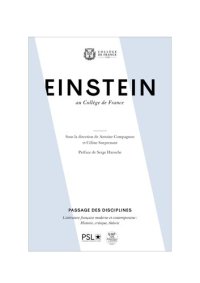
Ebook: Einstein au Collège de France
- Series: Passage des disciplines
- Year: 2020
- Publisher: Collège de France
- City: Paris
- Language: French
- pdf
In 1914, Albert Einstein was invited to deliver the Michonis Lectures at the Collège de France, which had been organized thanks to Georges Michonis from 1905 onwards to welcome foreign scholars to the Collège de France. The outbreak of the First World War however prevented Einstein from coming to Paris. At the instigation of Paul Langevin, professor of General and Experimental Physics (1909-1946), the invitation was renewed in February 1922, shortly after the astronomer Sir Arthur Eddington had tested the theory (in 1919) that contributed to Einstein’s international fame.
Taking Einstein’s visit to the Collège as as the main thread, the 3rd volume of the series focuses on the impact of his ideas on French physics and more generally on the formation of disciplines and the arts (from the 1910s until the Second World War) in France and beyond. Unlike the ideas of Freud and Darwin, which were not well received at the Collège and which were the subject of the first two volumes of the series, respectively, Einstein’s theory of relativity attracted the attention of Paul Langevin, who presented it as early as 1910-1911 in his teachings. Other professors at the Collège also took an interest in it, such as Léon Brillouin (Theoretical Physics, 1932-1949), Frédéric Joliot (Nuclear Physics, 1937-1958) and André Lichnérowicz (Mathematical Physics, 1952-1986), as well as philosophy, poetics and history professors (Henri Bergson [Modern Philosophy, 1904-1921], Paul Valéry [Poetics, 1937-1945], Lucien Febvre [History of Modern Civilization, 1933-1949], and Maurice Merleau-Ponty [Philosophy, 1952-1961]) to name but a few.
Volume 3 of the “Passage des disciplines” series includes texts that were presented during the symposium “Einstein at the Collège de France” (11-12 June 2018), organized by Antoine Compagnon (Modern and Contemporary French Literature), Jean Dalibard (Atoms and Radiation), and Jean-François Joanny (Soft Matter and Biophysics), as part of “Passage des disciplines: Global history of the Collège de France, 19th-20th century”. This research programme and the series associated with it examines the genesis of scientific and literary fields of knowledge, their mapping and their evolution during the 19th and 20th centuries, on both national and international levels, from the standpoint afforded by the history of the renewal of academic Chairs at the Collège de France. It is headed by Antoine Compagnon, in collaboration with Céline Surprenant, and receives the financial support of PSL (2016-2019) and the Fondation Hugot.
Taking Einstein’s visit to the Collège as as the main thread, the 3rd volume of the series focuses on the impact of his ideas on French physics and more generally on the formation of disciplines and the arts (from the 1910s until the Second World War) in France and beyond. Unlike the ideas of Freud and Darwin, which were not well received at the Collège and which were the subject of the first two volumes of the series, respectively, Einstein’s theory of relativity attracted the attention of Paul Langevin, who presented it as early as 1910-1911 in his teachings. Other professors at the Collège also took an interest in it, such as Léon Brillouin (Theoretical Physics, 1932-1949), Frédéric Joliot (Nuclear Physics, 1937-1958) and André Lichnérowicz (Mathematical Physics, 1952-1986), as well as philosophy, poetics and history professors (Henri Bergson [Modern Philosophy, 1904-1921], Paul Valéry [Poetics, 1937-1945], Lucien Febvre [History of Modern Civilization, 1933-1949], and Maurice Merleau-Ponty [Philosophy, 1952-1961]) to name but a few.
Volume 3 of the “Passage des disciplines” series includes texts that were presented during the symposium “Einstein at the Collège de France” (11-12 June 2018), organized by Antoine Compagnon (Modern and Contemporary French Literature), Jean Dalibard (Atoms and Radiation), and Jean-François Joanny (Soft Matter and Biophysics), as part of “Passage des disciplines: Global history of the Collège de France, 19th-20th century”. This research programme and the series associated with it examines the genesis of scientific and literary fields of knowledge, their mapping and their evolution during the 19th and 20th centuries, on both national and international levels, from the standpoint afforded by the history of the renewal of academic Chairs at the Collège de France. It is headed by Antoine Compagnon, in collaboration with Céline Surprenant, and receives the financial support of PSL (2016-2019) and the Fondation Hugot.
Download the book Einstein au Collège de France for free or read online
Continue reading on any device:

Last viewed books
Related books
{related-news}
Comments (0)